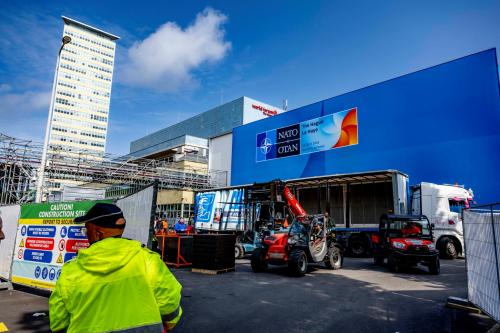This was originally published in the Guardian Unlimited under the title “The Wrong Audience.”
After the recent IMF-World Bank ministerial meetings on the global economy in Washington, what is needed now is an agenda for parliaments and publics that will clarify the decisions and actions required to meet the concerns of ordinary people regarding security of financial stability, jobs, incomes and poverty reduction. Finance ministers spent time talking to each other and approving communiqués which keep the conversation going among them but not between them and the people they serve and represent. There needs to be a change in language and a change in content for publics to understand what is at stake and what is being done to get things back on track.
The most important actions for legislators, lawmakers and parliamentarians is to scrutinise their domestic means of financial sector oversight, monitoring, evaluation, supervision and regulation to strengthen laws, rules, norms and institutions so that their economies will be less vulnerable to turbulence, whether from internal or external sources. At the very least, the US Congress needs to enact equivalent oversight on investment banks that it has exerted over commercial banks, in exchange for the financial support the Federal Reserve has put behind Bear Stearns and potentially other investment banks. But a broader sweep of scrutiny and a wider scope for reform has to be cast by Congress and other parliaments to assure their financial markets are strong enough to weather the next financial storm.
To facilitate this scrutiny, officials from central banks, finance ministries and oversight agencies from major economies need to be convened into policy committees by the IMF to review their experiences and practices together, to compare insights, to examine weaknesses and gaps, and to generate new procedures, processes and practices which address today’s more complex markets and sophisticated financial instruments. This is urgent and important work. The IMF is well suited to serve as convener and catalyst for such an effort. The IMF, for all its flaws, is a universal membership organisation with global reach. Peer review is a common practice at the OECD and can be effectively supported by the IMF staff. These IMF policy committees composed of officials from capitals who would report back to their countries on conclusions reached, would also serve to provide recommendations to ministers of finance groups for common actions resulting from this work. Parliaments would need to be brought into the conversation on both the national and global actions contemplated so that they would better grasp their role in enacting legislation to carry out these conclusions.
What was missing at the IMF-World Bank spring meetings was a sense of the interconnectedness between the actions of financial officials and the actions of law makers, and a notion that the processes of policy development should be designed to involve legislators throughout, since in the end the laws, budgets, institutional innovations and new regulatory frameworks need to be enacted by parliaments, not decreed by ministries or central banks. Policy development needs to be an interactive process which involves importantly public opinion and the perceptions of challenges and remedies, of action and inaction, of responsibility and accountability, which, if lacking from the policy development process will defeat it in the end. There is a parliamentary network for the international financial institutions, the Parliamentary Network on the World Bank (PNoWB), which could be more centrally incorporated into the financial reform process as one step toward enhancing the involvement of legislatures.
Another set of issues discussed by ministers at their spring meetings revealed a similar blind sidedness in relation to parliaments, and that was the global poverty reduction effort currently underway to achieve the Millennium Development Goals (MDGs) by 2015. The world is at the midpoint in this process, and indications are that some developing countries are lagging behind the trajectory needed to meet the MDGs and some advanced countries are behind meeting the development cooperation targets critical to the MDGs. What both developing countries and advanced countries will do to accelerate progress toward meeting the the MDGs by 2015 will depend importantly on budgetary and policy actions by parliaments in both sets of countries.
Beyond this, the process currently underway to review progress toward the MDGs involves officials from ministries of finance, development and foreign affairs in various fora including the G8 summit in Japan in July and the financing for development conference in Doha in December. The OECD announced on April 4 that “most donors are not on track to meet their stated commitments to scale up aid” and yet all that ministers were able to say on April 13 on the matter was: “As the MDG midpoint, 2008 is a crucial year for generating the necessary momentum towards the MDGs.”
The European Commission did much better in its declaration on April 9, saying that the “EU must stand by its promises and deliver on development aid if we are to meet the MDGs,” and that “Each member state should come forward with a multi-annual plan, indicating the exact increases planned per year.” At the National Cathedral in Washington on April 13, more than 90 organisations came up with 70 commitments amounting to over $650m to address the MDG on gender equality and women in development. World Bank president Robert Zoellick forged an innovative step at the spring meetings by getting ministers to back his “new deal for food policy” involving more than a $1bn in new commitments to address malnutrition, what he called “the forgotten” MDG.
The Millennium Development Goals are aspirational goals. They represent what most human beings would wish for all human beings. They articulate a world in which there would be gender equality, universal primary education and literacy, less child and maternal mortality, a reduction in the incidence of HIV and Aids and other infectious diseases, sustainability in resource use, less malnutrition and poverty and more international cooperation and collaboration to meet these hopes for all humanity. These aspirations are public aspirations, not technical, policy oriented goals alone. Parliaments are the ultimate adjudicators of values and trade-offs between priorities and must ultimately render judgments on where budget resources and policy efforts are directed as between home and abroad, as between war and peace, as between health and education, as between poverty and the environment.
Legislators need to be brought more deeply and continuously into the global conversation about the MDGs, both to engage them in the difficult budgetary choices to be faced immediately to get back on track to meet them by 2015, and also to make judgments about the most effective pathways and combinations of institutional, human and security investments that are necessary for each country.
The missed opportunities at the IMF-World Bank spring meetings of ministers was fundamentally driven by their having the wrong audience in mind. The urgency of their business had them talking to themselves, when they needed to be talking to the world and the elected parliamentarians and legislators who ultimately will have to decide what to do restore confidence in the global economy and restore the momentum to bring the world back on track to achieve the MDGs by 2015.
What needs to happen now is to use the run-up to the annual meetings of finance ministers from all 185 countries in October to develop a new discourse, a new agenda for action and new modalities for policy dialogue. These innovations are necessary so that political decisions can be made by ministerial groupings in the fall, more ambitious and far-reaching reforms can be announced and better communications can be engaged with parliaments and publics about the stakes and the responsibilities involved in meeting this conjuncture of global economic challenges. Some of the IMF governance reforms (gold sales, basic votes, a quota increase, et cetera) will need to go to Congress and other parliaments for approval this fall in any case. Generating momentum and dialogue about changes in the IMF’s role and activities between now and then will increase the chances of serious debate and significant decisions about IMF governance reform. Debate and decisions about function and form will reinforce each other.
The Brookings Institution is committed to quality, independence, and impact.
We are supported by a diverse array of funders. In line with our values and policies, each Brookings publication represents the sole views of its author(s).



Commentary
Op-edThe Spring Meetings and the Global Economy
May 2, 2008